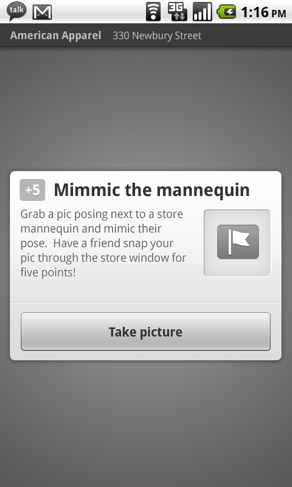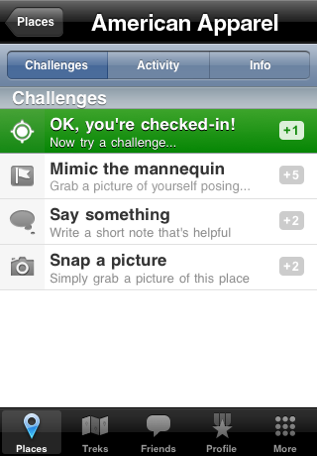 It was only a matter of time. Since last summer, we’ve been tracking the progress of SCVNGR, a location-based gaming platform that allows users to build engaging, real-world scavenger hunts that use their mobile devices to both receive clues and solve riddles. Until now the service has primarily catered to museums, universities, and businesses, who use it for things like tours, orientations, and team-building exercises (they’re up to over 600 paying customers). Now SCVNGR, which recently raised $4 million from Google Ventures, is getting a bit more ambitious: it’s looking to turn the world into one big scavenger hunt, and it’s going to be taking on the likes of Foursquare and Gowalla in the process.
It was only a matter of time. Since last summer, we’ve been tracking the progress of SCVNGR, a location-based gaming platform that allows users to build engaging, real-world scavenger hunts that use their mobile devices to both receive clues and solve riddles. Until now the service has primarily catered to museums, universities, and businesses, who use it for things like tours, orientations, and team-building exercises (they’re up to over 600 paying customers). Now SCVNGR, which recently raised $4 million from Google Ventures, is getting a bit more ambitious: it’s looking to turn the world into one big scavenger hunt, and it’s going to be taking on the likes of Foursquare and Gowalla in the process.
To mark the launch of this new consumer-facing side of SCVNGR, the startup has launched new applications for iPhone and Android (you can grab the iPhone app here, and a QR code for the Android app is here) (it’s US-only for now). If you’ve used Foursquare or Gowalla before, the applications should look pretty familiar at first — you can ‘check-in’ to any of the 20 million venues in the SCVNGR database and see what your friends are up to. But there’s a key difference: SCVNGR revolves around interactive ‘challenges’, which users are prompted to complete when they visit a venue. These can range from simple things, like the act of checking-in at a venue or taking a goofy photo with a store mannequin, to much richer experiences, depending on how creative the business gets.
SCVNGR CEO Seth Priebatsch acknowledges that this is already a crowded space with some very well-funded competitors, but he believes that this ‘challenge’ angle will be enough to differentiate SCVNGR from the rest of the pack. He explains that the value of a check-in on a service like Foursquare tends to be very transient in nature — if you see that check-in an hour or two after it was created, there’s a good chance it is no longer relevant, as the user may well have moved on to their next destination. Challenges, Priebatsch believes, have a much longer shelf life.

As an example, Priebatsch described what might happen if you walked into a local burrito shop that had set up a few challenges on SCVNGR. After pulling out your phone and checking in, the app could prompt you to build an origami figure out of the tin foil your burrito came in, and to upload a picture of your creation to the service. Doing so would reward you with some SCVNGR points (which are currently valueless but will likely be part of a reward system in the future). So while your friends may not see your check-in by hours or days, they would probably still enjoy the photo of your burrito’s tin foil swan. Another challenge could charge users with using clues scattered around a store to solve a riddle, for example.
Challenges can be created by anyone, including both business owners and their customers (you could also create challenges at a non-business venue like a park if you wanted to). Screening and flagging systems are in place to ensure that there aren’t any inappropriate challenges. And while most challenges will be created from phones, businesses that want to create challenges at multiple locations at once (like a restaurant chain), will be able to do so using SCVNGR’s enterprise tools.
In some ways SCVNGR is late to the game — aside from Foursquare, there are plenty of other competitors, including Loopt, Gowalla, Brightkite, and probably Facebook in the near future, and all of them are going to be vying for attention from local businesses. Every venue in SCVNGR’s database will come with three basic challenges (one of which is a basic check-in), but it will only be fun if users and businesses start putting the time in to make engaging, creative challenges. In this sense, there’s a bit of a chicken-and-egg problem.
All of that said, I like that SCVNGR is setting out to offer a more engaging experience than Foursquare and Gowalla, which I got bored of pretty quickly (yes, I know plenty of people are totally addicted to them — I just find the gaming elements of these services to be superficial). I suspect the popularity of SCVNGR will be tied to how widespread challenges are, and, more important, how fun they are. Likewise, SCVNGR is going to have to incent users to play the game by getting businesses to offer rewards and coupons for completing their challenges (show them the money). Some gamers will keep jumping on to SCVNGR because it’s fun, but the service needs a carrot to dangle in front of users to get them hooked.


